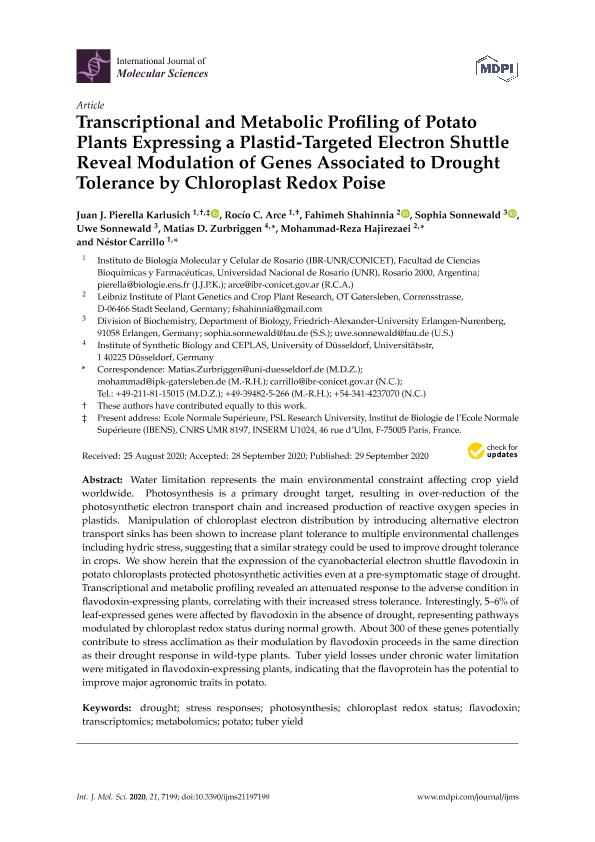Mostrar el registro sencillo del ítem
dc.contributor.author
Pierella Karlusich, Juan José

dc.contributor.author
Arce, Rocio Cecilia

dc.contributor.author
Shahinnia, Fahimeh
dc.contributor.author
Sonnewald, Sophia
dc.contributor.author
Sonnewald, Uwe
dc.contributor.author
Zurbriggen, Matias Daniel

dc.contributor.author
Hajirezaei, Mohammad Reza
dc.contributor.author
Carrillo, Nestor Jose

dc.date.available
2023-01-26T10:45:40Z
dc.date.issued
2020-10
dc.identifier.citation
Pierella Karlusich, Juan José; Arce, Rocio Cecilia; Shahinnia, Fahimeh; Sonnewald, Sophia; Sonnewald, Uwe; et al.; Transcriptional and metabolic profiling of potato plants expressing a plastid-targeted electron shuttle reveal modulation of genes associated to drought tolerance by chloroplast redox poise; MDPI AG; International Journal of Molecular Sciences; 21; 19; 10-2020; 1-22
dc.identifier.issn
1661-6596
dc.identifier.uri
http://hdl.handle.net/11336/185648
dc.description.abstract
Water limitation represents the main environmental constraint affecting crop yield worldwide. Photosynthesis is a primary drought target, resulting in over-reduction of the photosynthetic electron transport chain and increased production of reactive oxygen species in plastids. Manipulation of chloroplast electron distribution by introducing alternative electron transport sinks has been shown to increase plant tolerance to multiple environmental challenges including hydric stress, suggesting that a similar strategy could be used to improve drought tolerance in crops. We show herein that the expression of the cyanobacterial electron shuttle flavodoxin in potato chloroplasts protected photosynthetic activities even at a pre-symptomatic stage of drought. Transcriptional and metabolic profiling revealed an attenuated response to the adverse condition in flavodoxin-expressing plants, correlating with their increased stress tolerance. Interestingly, 5–6% of leaf-expressed genes were affected by flavodoxin in the absence of drought, representing pathways modulated by chloroplast redox status during normal growth. About 300 of these genes potentially contribute to stress acclimation as their modulation by flavodoxin proceeds in the same direction as their drought response in wild-type plants. Tuber yield losses under chronic water limitation were mitigated in flavodoxin-expressing plants, indicating that the flavoprotein has the potential to improve major agronomic traits in potato.
dc.format
application/pdf
dc.language.iso
eng
dc.publisher
MDPI AG
dc.rights
info:eu-repo/semantics/openAccess
dc.rights.uri
https://creativecommons.org/licenses/by/2.5/ar/
dc.subject
CHLOROPLAST REDOX STATUS
dc.subject
DROUGHT
dc.subject
FLAVODOXIN
dc.subject
METABOLOMICS
dc.subject
PHOTOSYNTHESIS
dc.subject
POTATO
dc.subject
STRESS RESPONSES
dc.subject
TRANSCRIPTOMICS
dc.subject
TUBER YIELD
dc.subject.classification
Bioquímica y Biología Molecular

dc.subject.classification
Ciencias Biológicas

dc.subject.classification
CIENCIAS NATURALES Y EXACTAS

dc.title
Transcriptional and metabolic profiling of potato plants expressing a plastid-targeted electron shuttle reveal modulation of genes associated to drought tolerance by chloroplast redox poise
dc.type
info:eu-repo/semantics/article
dc.type
info:ar-repo/semantics/artículo
dc.type
info:eu-repo/semantics/publishedVersion
dc.date.updated
2021-09-06T21:02:43Z
dc.identifier.eissn
1422-0067
dc.journal.volume
21
dc.journal.number
19
dc.journal.pagination
1-22
dc.journal.pais
Estados Unidos

dc.description.fil
Fil: Pierella Karlusich, Juan José. Consejo Nacional de Investigaciones Científicas y Técnicas. Centro Científico Tecnológico Conicet - Rosario. Instituto de Biología Molecular y Celular de Rosario. Universidad Nacional de Rosario. Facultad de Ciencias Bioquímicas y Farmacéuticas. Instituto de Biología Molecular y Celular de Rosario; Argentina
dc.description.fil
Fil: Arce, Rocio Cecilia. Consejo Nacional de Investigaciones Científicas y Técnicas. Centro Científico Tecnológico Conicet - Rosario. Instituto de Biología Molecular y Celular de Rosario. Universidad Nacional de Rosario. Facultad de Ciencias Bioquímicas y Farmacéuticas. Instituto de Biología Molecular y Celular de Rosario; Argentina
dc.description.fil
Fil: Shahinnia, Fahimeh. Leibniz Institute Of Plant Genetics And Crop Plant Research; Alemania
dc.description.fil
Fil: Sonnewald, Sophia. Universitat Erlangen-Nuremberg; Alemania
dc.description.fil
Fil: Sonnewald, Uwe. Universitat Erlangen-Nuremberg; Alemania
dc.description.fil
Fil: Zurbriggen, Matias Daniel. University of Düsseldorf; Alemania. Consejo Nacional de Investigaciones Científicas y Técnicas. Centro Científico Tecnológico Conicet - Rosario. Instituto de Biología Molecular y Celular de Rosario. Universidad Nacional de Rosario. Facultad de Ciencias Bioquímicas y Farmacéuticas. Instituto de Biología Molecular y Celular de Rosario; Argentina
dc.description.fil
Fil: Hajirezaei, Mohammad Reza. Leibniz Institute Of Plant Genetics And Crop Plant Research; Alemania
dc.description.fil
Fil: Carrillo, Nestor Jose. Consejo Nacional de Investigaciones Científicas y Técnicas. Centro Científico Tecnológico Conicet - Rosario. Instituto de Biología Molecular y Celular de Rosario. Universidad Nacional de Rosario. Facultad de Ciencias Bioquímicas y Farmacéuticas. Instituto de Biología Molecular y Celular de Rosario; Argentina
dc.journal.title
International Journal of Molecular Sciences
dc.relation.alternativeid
info:eu-repo/semantics/altIdentifier/doi/http://dx.doi.org/10.3390/ijms21197199
Archivos asociados
